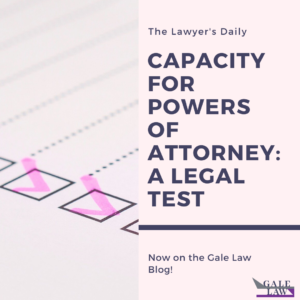
This article was originally published by The Lawyer’s Daily (www.thelawyersdaily.ca), part of LexisNexis Canada Inc.
Last month we looked at the capacity for a will. Now we will look at the capacity for powers of attorney, mainly the power of attorney for property and power of attorney for personal care.
Power of attorney for property
Section 8 (1) of the Substitute Decisions Act, 1992 (the Act) states:
“A person is capable of giving a continuing power of attorney if he or she,
- knows what kind of property he or she has and its approximate value;
- is aware of obligations owed to his or her dependents;
- knows that the attorney will be able to do on the person’s behalf anything in respect of property that the person could do if capable, except make a will, subject to the conditions and restrictions set out in
- knows that the attorney must account for his or her dealings with the person’s property;
- knows that he or she may, if capable, revoke the continuing power of attorney;
- appreciates that unless the attorney manages the property prudently its value may decline;
- appreciates the possibility that the attorney could misuse the authority given to him or her”
Power of attorney for personal care
Section 47(1) of the Act states:
“A person is capable of giving a power of attorney for personal care if the person,
- has the ability to understand whether the proposed attorney has a genuine concern for the person’s welfare; and
- appreciates that the person may need to have the proposed attorney make decisions for the person”
The Act further states:
A person is capable of revoking a continuing power of attorney if he or she is capable of giving one (s.8(2)).
A continuing power of attorney is valid if the grantor, at the time of executing it, is capable of giving it, even if he or she is incapable of managing property (s. 9(1)).
The continuing power of attorney remains valid even if, after executing it, the grantor becomes incapable of giving a continuing power of attorney (s. 9(2)).
Some would say that the requisite capacity to grant a power of attorney for property is “higher” and requires a greater ability to understand and appreciate compared to the capacity to grant a power of attorney for personal care. However, in Covello v. Sturino [2007] O.J. No. 2306, Justice Rose Boyko stated that the requisite capacity shouldn’t be judged as “higher” or “lower” but simply different.
In the case of Knox v. Burton [2004] O.J. No. 1267, upheld by the Court of Appeal, Petronella Knox was 80 years old and following a family conflict, three capacity assessors were retained, whereby one found her incapable and two found her capable.
It was decided that she was capable based on the presumption of capacity that had not been rebutted by any compelling evidence. It was stated that there is no value describing capacity as high or low. A person who is cognitively impaired can fluctuate, meaning they can be capable at one time and incapable at another.
This case shows that an expert opinion may not be definitive. The capacity assessor should focus on the person’s ability to reason and understand rather than the family dispute. The question of capacity is a finding of fact.
A legal test
The capacity to grant or revoke a power of attorney is a legal test. It is up to the lawyer drafting the power of attorney documents to determine capacity. If the lawyer is satisfied that there is capacity and has documented his/her discussion with the client, there may not be a need for a capacity assessment.
If the lawyer has doubts, a capacity assessment is helpful, although the person with questionable capacity would need to agree to this assessment. It is the duty of the lawyer to ensure the client is capable of granting either kind of power of attorney before arranging the signing of these documents. Lawyers should be well versed in the criteria for capacity, conduct a thorough interview and ultimately use good judgment when deciding whether a client is capable.
